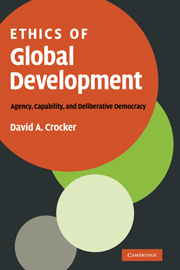Crossref Citations
This Book has been
cited by the following publications. This list is generated based on data provided by Crossref.
Crocker, David A.
2007.
Deliberative Participation in Local Development.
Journal of Human Development,
Vol. 8,
Issue. 3,
p.
431.
Caquard, Sébastien
Pyne, Stephanie
Igloliorte, Heather
Mierins, Krystina
Hayes, Amos
and
Taylor, D.R. Fraser
2009.
A “Living” Atlas for Geospatial Storytelling: The Cybercartographic Atlas of Indigenous Perspectives and Knowledge of the Great Lakes Region.
Cartographica: The International Journal for Geographic Information and Geovisualization,
Vol. 44,
Issue. 2,
p.
83.
Alkire, Sabina
2009.
Amartya Sen.
p.
191.
Crocker, David A.
2009.
El ciudadano democrático.
p.
47.
Salazar, Daniela Gallegos
2009.
El ciudadano democrático.
p.
75.
Crocker, David A.
and
Robeyns, Ingrid
2009.
Amartya Sen.
p.
60.
Horton, Keith
and
Roche, Chris
2010.
Ethical Questions and International NGOs.
Vol. 23,
Issue. ,
p.
1.
Kosko, Stacy J.
2010.
Parental Consent and Children’s Rights in Europe: A Balancing Act.
Journal of Human Development and Capabilities,
Vol. 11,
Issue. 3,
p.
425.
Gardiner, Stephen M.
2010.
Ethics and climate change: an introduction.
WIREs Climate Change,
Vol. 1,
Issue. 1,
p.
54.
Edwards, D. Brent
2010.
A Comparison of Local Empowerment in Education: Porto Alegre, Brazil and Chicago, USA.
Research in Comparative and International Education,
Vol. 5,
Issue. 2,
p.
176.
Edwards, D. Brent
2010.
Missing the Point: A Rejoinder to Pearl and Knight on the Necessary Cross-Pollination of Democratic Education and Critical Pedagogy.
The Urban Review,
Vol. 42,
Issue. 3,
p.
249.
Thompson, Paul B.
2010.
Food Aid and the Famine Relief Argument (Brief Return).
Journal of Agricultural and Environmental Ethics,
Vol. 23,
Issue. 3,
p.
209.
Brent Edwards, D.
2010.
Critical Pedagogy and Democratic Education: Possibilities for Cross-Pollination.
The Urban Review,
Vol. 42,
Issue. 3,
p.
221.
Marangos, John
and
Astroulakis, Nikos
2010.
The Aristotelian Contribution to Development Ethics.
Journal of Economic Issues,
Vol. 44,
Issue. 2,
p.
551.
St. Clair, Asunción Lera
2010.
Climate Change, Ethics and Human Security.
p.
180.
Edwards, D. Brent
2010.
Trends in Governance and Decision-Making: A Democratic Analysis with Attention to Application in Education.
Policy Futures in Education,
Vol. 8,
Issue. 1,
p.
111.
Alkire, Sabina
2010.
Human Development: Definitions, Critiques, and Related Concepts.
SSRN Electronic Journal,
2011.
An Introduction to International Economics.
p.
353.
Storper, Michael
2011.
Justice, efficiency and economic geography: should places help one another to develop?.
European Urban and Regional Studies,
Vol. 18,
Issue. 1,
p.
3.
Graf, Gunter
2011.
Der Capability-Approach in sozialwissen - schaftlichen Kontexten.
p.
11.



